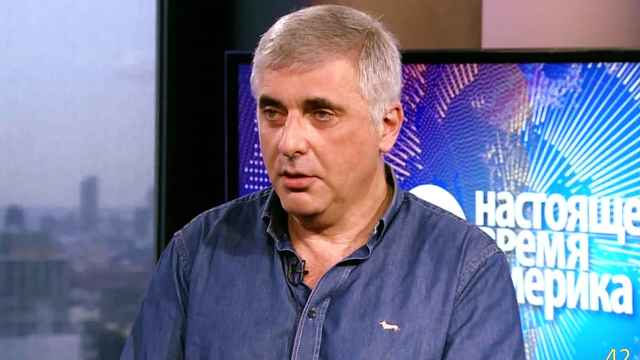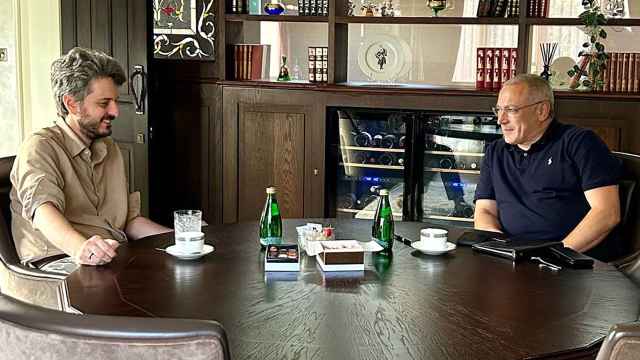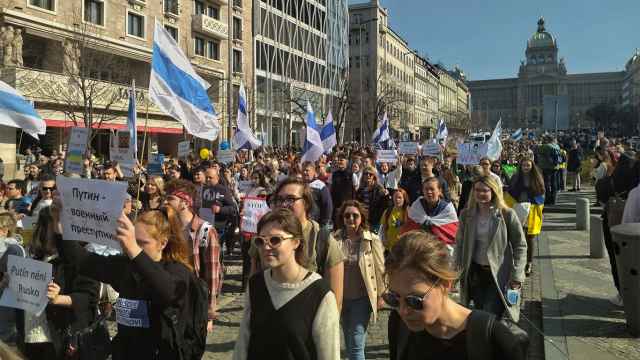The team of late Russian opposition figure Alexei Navalny on Thursday accused a Russian-Israeli billionaire of ordering the violent March attack on Navalny ally Leonid Volkov, citing evidence it obtained.
Volkov, Navalny’s ex-chief of staff and former chairman of his Anti-Corruption Foundation (FBK), was attacked with tear gas and a hammer outside his home in Lithuania on March 12. Poland said it arrested three suspects in connection with the assault, with Lithuania saying it suspected Russian special services were behind the attack.
“Leonid Nevzlin ordered the beating and kidnapping of Volkov,” Navalny’s team said.
Nevzlin is the former co-owner of exiled Kremlin critic Mikhail Khodorkovsky's now-defunct oil company Yukos. He emigrated to Israel in 2003.
“But Nevzlin was unhappy with the result and didn’t pay the promised $250,000 for the work,” the team said, adding that it led to a dispute between the businessman and the alleged organizer of the attack.
Navalny’s team said it ended up with audio and visual evidence of Nevzlin’s involvement from a so-called “fixer” named Andrei Matus who was reportedly ordered to seize the hitmen’s phones.
Team Navalny said it had arranged a meeting with Matus in Montenegro, where the “fixer” played a recording of his phone conversation with Nevzlin corroborating the details of the attack on Volkov and two other attacks on exiled opposition members.
Team Navalny said Matus “disappeared” soon after learning that they would not be able to pay him for the information. “A few weeks later we saw his materials on the [Kremlin-funded broadcaster] Russia Today website,” Team Navalny said.
The Moscow Times could not independently verify any of the materials published on Navalny’s website. The Insider, an independent investigative outlet, said it obtained screenshots of the correspondence partially published by Team Navalny and RT and said it was “highly likely” to be genuine.
Team Navalny said it believes “stupid senseless hatred” combined with “political competition” may have driven the attack on Volkov.
Nevzlin denied having involvement in “any attacks on people, in any form whatsoever.”
“Secondly, I don't see much point in discussing the details of this 'leak' concocted in Moscow,” he wrote on his Telegram channel. “Let these so-called 'materials' be assessed first by an independent investigation and, if the investigation deems it necessary, by a court in a democratic country. I am convinced that justice will confirm the absurdity and complete untenability of the accusations against me.”
Responding to Team Navalny's accusations against Nevzlin, Khodorkovsky said: “Either it is true, and then Leonid Nevzlin has gone mad. Or it is an FSB provocation and a fake on which a lot of money has been spent. We have seen such provocations more than once, for example, in the Magnitsky case.
“For some reason, [FBK investigator] Maria Pevchikh confidently chooses the first version. For perfectly understandable reasons, I lean towards the second,” he continued, calling for the allegations to be investigated by law enforcement.
Team Navalny said it notified the law enforcement agencies of countries where Nevzlin is thought to reside and was ready to hand over its records.
“I cannot wrap my head around this information yet. Khodorkovsky spent 10 years in jail; Putin expropriated his multi-billion-dollar business. Since 2013, Khodorkovsky was a prominent voice in exile. (Nevzlin fled to Israel in 2003, when Khodorkovsky's empire was under assault from Putin.)," economist and political commentator Konstantin Sonin wrote on X (formerly Twitter).
"What I can say is that @navalny's team has had an impeccable reputation in investigative journalism. With Alexei and then without him, they uncovered many critical episodes of [the Putin regime's] corruption, their influence networks, their military connections, etc.," he wrote.
A Message from The Moscow Times:
Dear readers,
We are facing unprecedented challenges. Russia's Prosecutor General's Office has designated The Moscow Times as an "undesirable" organization, criminalizing our work and putting our staff at risk of prosecution. This follows our earlier unjust labeling as a "foreign agent."
These actions are direct attempts to silence independent journalism in Russia. The authorities claim our work "discredits the decisions of the Russian leadership." We see things differently: we strive to provide accurate, unbiased reporting on Russia.
We, the journalists of The Moscow Times, refuse to be silenced. But to continue our work, we need your help.
Your support, no matter how small, makes a world of difference. If you can, please support us monthly starting from just $2. It's quick to set up, and every contribution makes a significant impact.
By supporting The Moscow Times, you're defending open, independent journalism in the face of repression. Thank you for standing with us.
Remind me later.






